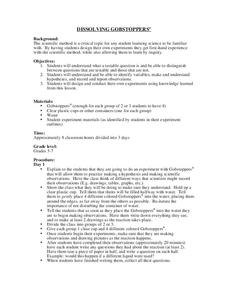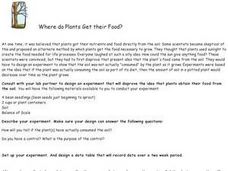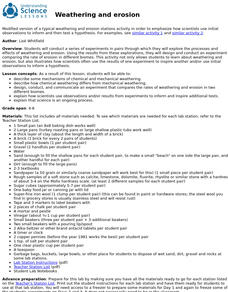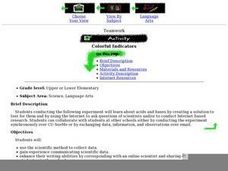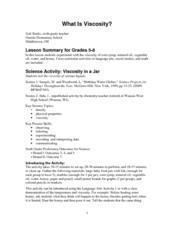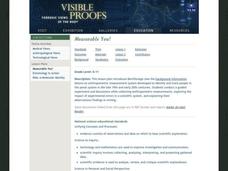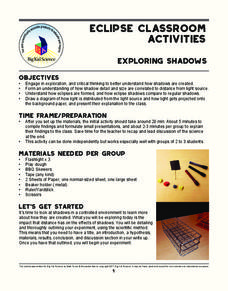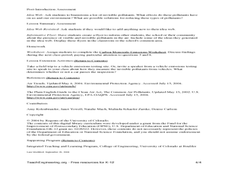Curated OER
Doing Science
For this doing science worksheet, students review the process of doing a science experiment. Students also match the SI unit with what it measures. This worksheet has 7 fill in the blank and 4 matching questions.
Curated OER
Backyard Bacteria
Students demonstrate safe ways to handle bacteria, prepare agar plates, and grow bacterial cultures. They identify different kinds of bacterial colonies, and devise a controlled experiment.
Curated OER
The Good and Bad Bacteria
High schoolers are able to name one kind of harmful bacteria and why it hurts us and also name one kind of helpful bacteria and how we use it. They describe the process of growing bacterial cultures in a lab. Students create a reasonable...
Curated OER
Following Directions
Kindergartners learn about the ways force can stop and reverse motion. Several illustrations of children help them determine if the motion is causing an item to change direction. Next, they conduct an experiment to see if a water balloon...
Edgemont Elementary School
Scientific Method Unit
Four out of five teenagers experiment with science by accident. This unit teaches the five parts of the scientific method through examples, guided practice, independent practice, and then through a hands-on experiment. Each step is...
Curated OER
Sky Observations Sky & Cloud Windows
Learners observe the sky and weather to gather data. They conduct experiments to answer questions about the sky and weather phenomena. They measure, analyze and present data. They create sky windows by gluing sky colored paint chips...
Curated OER
Dissolving Gobstoppers
Students design their own experiments . They study the scientific method and determine what a testable question is. They distinguish between questions that are testable and those that are not. They identify variables, make and understand...
Curated OER
Where Do Plants Get Their Food?
Plants need food to survive, just like any other living organism. Young biologists analyze an experiment performed in 1610 by Jan van Helmont to determine if plant nutrition is obtained through the soil. First, lab groups work together...
Curated OER
Ecology
Young scholars explore, experience and experiment identifying the human impact on the environment of vegetative differences within the same biome. They assess what causes deserts, rain forests, savannahs, tundras and saguaros and how...
Curated OER
Bend It! Stretch It! Squash It!
Some items keep their shape no matter what happens! Have your kindergarten class choose which items would stay the same if they were bent, stretched, or squashed. The last activity prompts kids to see what happens when they stretch a...
Curated OER
Does Soil Get Soggy?
Study the properties of soil and water absorption with a science activity. Based on a paragraph with background knowledge on sandy soil, silt, and clay soil, third graders choose which illustration represents a bottle full of sandy soil....
Curated OER
Night Here, Day There
Explore astronomy with a lab sheet for fifth grade scientists. After reading a short explanation about the earth's rotation, they solve a word problem about the differences in times across the world. Next, they make a model of the solar...
Curated OER
Plants have needs, too!
Plants can die if they don't get enough sunlight and water. Kindergartners observe a picture of a hanging plant and grass under a tree, and interpret which each plant has died. Next, they grow watercress seeds in wet cotton to compare...
Mr. Science
The Scientific Method
First, ask a question and then, do research. Next, form a hypothesis, and conduct an experiment. Make observations, gather and analyze data, and then state a conclusion based on the results. This is the scientific method, and here is a...
Kenan
Respiratory System
Explore the respiratory system with a model. First, pupils build a set of lungs to experiment how they inflate and deflate. Then, they delve deeper into the topic with a web quest to discover new information about the nose, trachea, and...
University of California
Weathering and Erosion
Just how powerful is erosion? Interested scientists learn how to identify the results of erosion with a series of lab activities. They move through stations to experiment with different types of erosion and then design and complete their...
Curated OER
Colorful Indicators
Young chemists learns about acids and bases by coming up with a solution that will test for each. They also access the Internet to perform research. They are encouraged to contact students in other schools by conducting the experiment at...
Curated OER
What Is Viscosity?
Students experiment with the visocosity of corn syrup, mineral oil, vegetable oil, water, and honey. They research viscosity before beginning. Pupils draw the conclusion that the marble sinks more slowly in the liquids with greater...
Curated OER
Measurable You!
Conduct guided experiments and discussions while collecting anthropometric measurements. Your class will explore impact of experimental errors in a scientific system, and explain their observations/findings in writing. An introduction to...
Curated OER
A Photosynthesis Timeline
Science learners discover that scientific advancements come in increments. Beginning as an idea, changes and developments are influenced by available resources and current societal values. As an example, pupils examine the conclusions...
Curated OER
Building a House
Study the different materials needed to build a house. Kindergartners and first graders read five sentence frames, and match the phrases that describe wood planks, glass, and clay. An experiment prompts kids to test different types of...
Big Kid Science
Exploring Shadows
What's that lurking in the shadows? An activity that demonstrates how eclipses happen. Science scholars investigate how light and distance interact to form shadows. The experiment uses simple materials to generate data and observations...
Cornell University
Nano What?
The size of a nanoparticle is difficult for pupils to grasp. A hands-on experiment is designed to give your classes perspective. Learners analyze different sports drinks for the content of electrolytes as an introduction to nanoscale....
Curated OER
I Don't Believe My Eyes!
Students develop their understanding of the effects of invisible air pollutants. In this invisible air lesson, students complete experiments with a rubber band air test, a bean plant experiment and by exploring engineering roles related...
Other popular searches
- Life Science Experiments
- Egg Science Experiments
- Hands on Science Experiments
- Space Science Experiments
- Food Science Experiments
- 5 Minute Science Experiments
- Simple Science Experiments
- Air Science Experiments
- Fun Science Experiments
- Earth Science Experiments
- Science Experiments Units
- Sea Life Science Experiments








